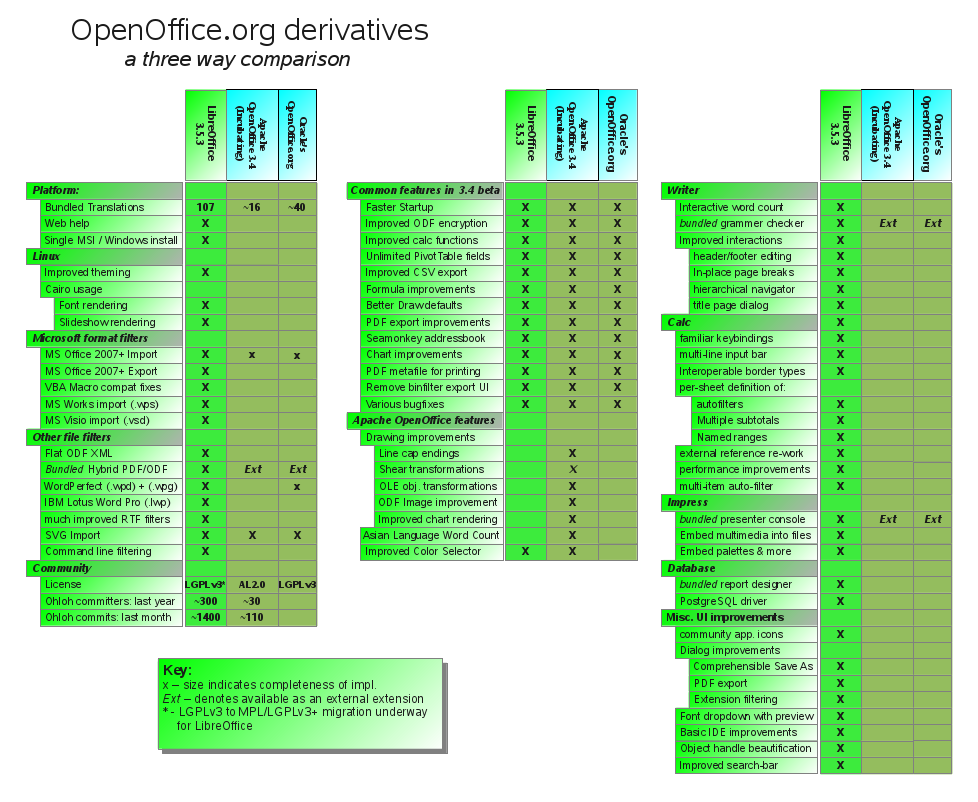Home » Uncategorized (Page 6)
Category Archives: Uncategorized
Mike Conlon on the Apache OpenOffice fork
The comment below was made on my blog, but it was so good, I’ve turned it into a post. It was written by Mike Conlon, who has written papers about forks in software.
It’s obvious that many of your correspondents either haven’t read your article [about the reasons against the Apache OpenOffice fork] or don’t understand it. However, I want to comment on forking.
First of all, the ability to fork is good. However, not all forks are good. Forking occurs when one set of parties in a development project develops serious objections to the direction the project is going. Once the fork occurs, usually the vast majority of the community choose one tine of the fork, and the other one withers.
Example: Remember XFree86? The leadership of the project became very unresponsive to community requests, to the point that many community members were complaining, and new contributors felt unwelcome. It actually forked into several tines, but soon most of the community settled on the X.org fork, which has thrived, while XFree86 went nowhere after the fork.
Sun was rather unresponsive to the OpenOffice.org community. Many potential contributors wouldn’t join the project because they would have been required to deed ownership of their code to Sun. But for whatever reason or reasons, the OpenOffice.org development community never grew to anything like the size of other open-source projects of similar scope. Then Oracle bought Sun, and many in the community simply didn’t trust Oracle to lead an open-source project properly. Sun was bad. Oracle was intolerable. The result was the LibreOffice fork.
LibreOffice appears to be thriving, while there seems to be little happening in Apache OpenOffice.org, other than press releases. This is a sign of a good fork. As some have commented, There is some instability in recent releases, but I also see the RIGHT THING™ where I didn’t see it before. (E.g., when you click on the change-the-font-size drop-down list, the current font size is now in the center of the list rather than at the top as before.) The increased pace of improvement is a major sign of the successful tine of the fork.
The Apache OpenOffice.org effort must be considered a fork of LibreOffice, even though it has its predecessor’s name. As you have indicated, the original OpenOffice.org project is dead. (The project is dead, but the Website lingers on…) So this isn’t the original, this is a fork. It’s a bad fork: it’s bad because there are no significant complaints about the direction of the LibreOffice effort. And, I believe, with you, that this fork is wasting resources, and it is dead. It is dead because (all complaints about which license is more desirable aside) there is no likelihood that developers will abandon LibreOffice for Apache OpenOffice.org.
Finally, a word about IBM (and other corporations related to open source development): IBM does not have friends. It has interests. When its interests align with the open source community, we will perceive IBM as “good.” When its interests do not align with the open source community, it will do things we consider “bad.” Remember that IBM, or any corporation, is legally required to do what is in the interest of its shareholders. Govern your relationship with the beast accordingly.
Response to the Global Futures 2045 Video
I have just watched this video by Global Futures 2045:
This is my list of things I disagree with:
I moved my response here.
New Article
I just got a new article posted on UnixMen.com, about how Apache OpenOffice is a house of sand.
Status update on LibreOffice / Apache OpenOffice
Michael Meeks has posted a status update on LibreOffice versus Apache OpenOffice. It is worth reading, but there are some points I’d like to add and emphasize.
The first is that the Apache OpenOffice project went public about a year ago. And in the meanwhile, all they’ve done is make a build with a small amount of new features:
Most of the new features they will announce are features done by Sun / Oracle, but never debugged / shipped. Only a handful of features have been achieved by this new organization. In other words, while Apache are now making a release under the OpenOffice brand, it is not a version moves things forward very much. It should be a concern that the value of the OpenOffice name is decreasing. How many would still be running Firefox if it didn’t make major improvements for 2 years? What is the point of a brand if you aren’t building the best product to represent it? It is cheapest if the brand is handed over to LibreOffice, though primarily IBM stands in the way. In the meanwhile, explaining to as many people as possible that LibreOffice is a better OpenOffice is helpful. I am happy several people mentioned LibreOffice in my movie interviews.
The Apache incubation started because IBM didn’t understand that LibreOffice had just build everything they would need and that copyleft is considered a good thing by many. IBM are convincing a few handfuls of naive contributors to use lax license with a primary benefit that allows IBM to use but not give back. I don’t recommend these people play poker.
The biggest point from that chart is that it documents how Apache OpenOffice is behind and will never be able to catch up with LibreOffice, especially considering their license prevents them from incorporating LO code. It should have been possible to predict these results a year ago, and now we have the evidence. I don’t expect these facts to make it into the skulls of smart but stubborn people at IBM, but it is a good reminder of the situation. There will surely be some announcements of their first release coming soon, and which will ask the community to try it out and help. Fortunately, the Linux community is already clued in to what is going on. LibreOffice is one of the most important communities to enable more people to run Linux on a full-time basis. There are many ways for people to help out.
Milton Friedman quotes
Here are some great quotes by Milton Friedman which describe some of the biggest problems in modern society.
The greatest advances of civilization, whether in architecture or painting, in science and literature, in industry or agriculture, have never come from centralized government.
The most important single central fact about a free market is that no exchange takes place unless both parties benefit.
The only way that has ever been discovered to have a lot of people cooperate together voluntarily is through the free market. And that’s why it’s so essential to preserving individual freedom.
If you put the federal government in charge of the Sahara Desert, in 5 years there’d be a shortage of sand.
Is it really true that political self-interest is nobler somehow than economic self-interest?
Many people want the government to protect the consumer. A much more urgent problem is to protect the consumer from the government.
Most economic fallacies derive from the tendency to assume that there is a fixed pie, that one party can gain only at the expense of another.
So that the record of history is absolutely crystal clear. That there is no alternative way, so far discovered, of improving the lot of the ordinary people that can hold a candle to the productive activities that are unleashed by a free enterprise system.
The black market was a way of getting around government controls. It was a way of enabling the free market to work. It was a way of opening up, enabling people.
The Great Depression, like most other periods of severe unemployment, was produced by government mismanagement rather than by any inherent instability of the private economy.




